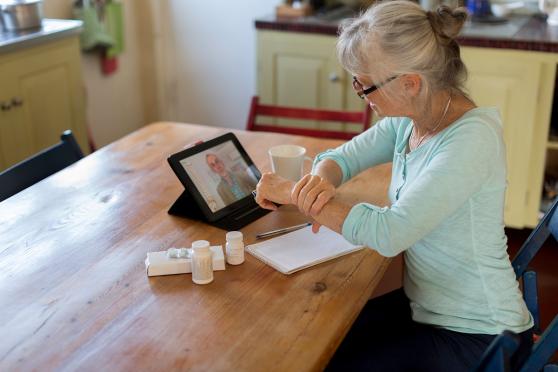What is an in-home health and wellness assessment?

Even if you’ve already had an annual checkup at your doctor’s office, this health visit from a licensed Matrix Medical Network clinician can help you stay healthy.
The information in this article is for educational purposes only and is not intended to replace medical advice from your doctor.
Not all health exams happen in a doctor’s office. With your health plan, you may be eligible for an in-home health and wellness assessment. A licensed Matrix Medical Network clinician will come to your home once a year for an in-depth checkup. Find out more about what to expect during the appointment and how to schedule one.
What is an in-home health and wellness assessment?
It is a complete wellness exam where the health care provider comes directly to your home. A Matrix clinician will talk to you about your health history and perform a series of health tests. These may include checking your heart rate, blood pressure, and blood sugar levels.
The Matrix providers are usually nurse practitioners, but sometimes a physician or physician assistant will perform the assessment.
“It’s a good way of making sure that you’re getting all of your medical needs met, and that you’re getting feedback on ways to stay healthy,” says Mary Nunziata, NP, a nurse practitioner with Matrix Medical Network in Georgia. (Some assessments can also be done virtually with a video visit.)
Why do I need this visit if I’ve had an annual checkup?
During your in-home health assessment, you can address concerns that weren’t discussed during your annual wellness visit, either because they're new concerns or because you ran out of time during your checkup.
A typical doctor’s appointment only lasts for about 18 minutes, according to a study in JAMA Health Forum. An in-home assessment lasts for up to an hour. With a Matrix clinician, there’s time to discuss health issues that may not have been addressed, such as overactive bladder symptoms or specifics about diabetes management, says Nunziata.
What’s included in a home health assessment?
It is a comprehensive evaluation of your health. Your Matrix clinician will likely start by discussing your personal and family medical history and the medications you currently take.
“Sometimes we have people who are on two of the same medications from two different doctors,” says Nunziata. In that case, your Matrix clinician may follow up with your primary care provider (PCP) about which and how much medication you should be taking. Other times, they may ask you to follow up with your PCP.
They will also check to make sure you are up to date on recommended medical screenings. These can vary, but your clinician may perform some or all of these tests:
- Rapid A1C test. This shows your average blood sugar levels over a three-month period. The results are given immediately and can diagnose type 1 and type 2 diabetes.
- Diabetic retinal screening. A small camera is used to check the back of the eye for signs of diabetes.
- Urinalysis. This test checks for kidney problems. These test results are available within two weeks.
- PAD test. A peripheral artery disease test checks for poor blood circulation or arterial disease. The test results are available immediately.
- Colon cancer screening. You’ll provide a stool sample and mail the specimen to a lab, which will send the test results within a few weeks.
- Mental health screening. The provider checks for issues such as depression.
- Fall risk assessment. You’ll find out how likely you are to fall.
A Matrix clinician can also tell you about important health benefits you might not know you have. You may qualify for a free fitness membership, for example. “They may also be able to direct you to other helpful resources in your area, such as a senior center”, says Nunziata.
Who needs an in-home health and wellness assessment the most?
“Anyone can benefit,” says Nunziata. But the people who may need them most are those with undiagnosed health problems. Nunziata says she recently referred one of her patients to the emergency room after she detected a low heart rate. The doctors later discovered the man had experienced a heart attack and needed a pacemaker.
Nunziata says that even the skeptics are usually pleased with the visit once it happens: “They’ve never had somebody spend 45 minutes talking to them about their history, their family history, their medications, and telling them ways to get services they didn’t know they had access to,” she says.
Home visits are also good for anyone who is managing one or more chronic health conditions, such as diabetes, high blood pressure, or kidney disease.
How do you schedule a home health assessment?
You can schedule an in-home health assessment online. A Matrix team member may also contact you directly to schedule an appointment at your convenience.
“Your appointment will take place within two weeks after scheduling it, and you’ll get a specific time a few days prior to the visit,” says Nunziata.
See our sources:
Average length of an annual physical: JAMA Health Forum
Medicare Advantage plans: Medicare.gov



